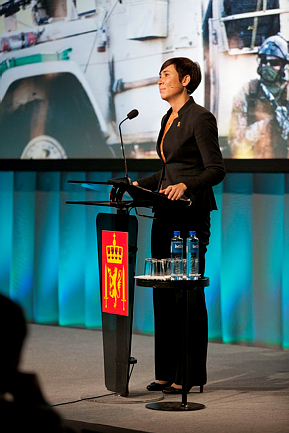Flowers and candlelight outside the Russian Embassy in Oslo on Sunday reflected local concern and alarm over the assassination of Russian opposition leader Boris Nemtsov. As the Norwegian government joined calls for an independent investigation into Nemtsov’s murder, its colder approach to Russia as expressed by Norwegian defense minister Ine Eriksen Søreide last week has come under fire.

Norwegian Foreign Minister Børge Brende joined German Chancellor Angela Merkel in claiming that Nemtsov’s murder late Friday night, on a city street right in front of the Kremlin, must be investigated independently. Russian President Vladimir Putin, who was under constant criticism from Nemtsov, was quick to announce he was taking personal control of the investigation but Brende and many other foreign ministers don’t think that’s a good idea.
As tens of thousands of Russians took to the streets on Sunday to mourn Nemtsov and protest yet another murder of a Putin critic, criticism was also rising in Norway over the Norwegian government’s harder line towards Putin and his government. Espen Barth Eide of the Labour Party, a former defense and foreign minister himself, claimed that all Norwegian governments are and have been best served to build on decades of cooperation with Russia, even during the Cold War.
“I believe it’s a matter of security policy to find our way back to the climate of cooperation we have had with Russia,” Eide told newspaper Dagsavisen over the weekend. He stressed how Norway has had “lengthy experience” in maintaining good neighbourly relations with Russia, then the Soviet Union and then Russia again, after the Soviet Union collapsed nearly 25 years ago.

Putin’s clear regret of that collapse, and his efforts to reestablish more control over former Soviet republics, has soured relations, especially since Russia’s intervention in Ukraine. Søreide told CNN last week that she doesn’t think there’s any way back to the relations that had become the norm over the past two decades.
Søreide stressed that Norway wants to cooperate with its large neighbour in the north, after “the dust settles,” but she believes the country faces a “different” Russia, and warned against thinking that the tensions of the past year will simply die down. The situation has fundamentally changed, she told CNN.
Her comments brought quick criticism from the Barents Secretariat, which is sponsored by Norway’s foreign ministry and works to improve relations between Norway and Russia.
“This type of statement does not promote cooperation,” Rune Rafaelsen, a senior adviser at the secretariat, told newspaper Klassekampen. Espen Barth Eide agreed, adding that Norway’s good relations with Russia over the years have been held up by other countries as an example to follow. “Many of the new NATO countries (that were former Soviet control) have often asked me what’s the key to our neighbourly relations,” Eide said.
‘Surprised and puzzled’
Thorvald Stoltenberg, also a former foreign minister for Labour, said he was surprised and puzzled by the remarks by someone whom he otherwise views as a “wise” defense minister. “If this means that she doesn’t believe in stronger cooperation between Norway and Russia, then I disagree,” Stoltenberg, father of the new NATO chief Jens Stoltenberg, told Dagsavisen. “Norway has never been in conflict with either the Soviet Union or Russia. That’s because we see that it’s best to further develop our cooperation, which strengthened enormously during the past 25 years.”
Kjell Magne Bondevik, a former foreign minister and prime minister for one of the government’s support parties, the Christian Democrats, also was concerned by Søreide’s remarks. “Putin has become more authoritarian than when I met him as prime minister,” Bondevik told Dagsavisen. “So Søreide is correct in saying that the situation has changed, but it’s wrong to conclude that it will be like this forever.”
Mette Kongshem, a retired Norwegian ambassador, recently wrote in newspaper Aftenposten that Norway should carefully evaluate its position “before we let the conflict in Ukraine destroy the solid relations Norway has had with Russia.” She urged that it’s important to see the world “with Russian eyes,” noting the Russia “can only be understood based on its history, culture and mentality.” She suggested that Russian leaders have reacted to what they see as western encroachment in what has been a “sensitive sphere” of Russian interests. Russia has become a weakened superpower clamouring to regain its status, and that the west has not managed “to treat Russia as an equal.” For Russia, Kongshem suggested, “Ukraine can never be just another country,” because of its historic and strategic importance.
‘Russia violated fundamental principles’
Bård Glad Pedersen, a state secretary for the conservative government coalition in the foreign ministry, agreed on Monday that it’s “been a strength for Norway that there is broad political agreement” on policies towards Russia and that its positive there’s now some debate. He claimed, though, that Norway’s “well-functioning relationship” with Russia has been achieved through “clear, predictable and consistent principles of sovereignty and respect for the rule of law.” Norway’s government believes Russia has violated fundamental principles, Pedersen said, adding that Ukraine’s right to sovereignty should be just as strong as Norway’s.
“We don’t want to go back to an international order where the big states did as they pleased, and the small states did what they had to,” Pedersen wrote. “Developments in Russia are worrisome. We must take Russia seriously, based on its actual policies.”
It’s correct, he added, that Norway has had special interests as a neighbour to Russia, and that it’s important to continue cooperation in areas of fishing, the environment and nuclear security, and search and rescue operations in the Barents Sea. “But carrying on as if nothing has happened, is not an alternative,” he wrote.
newsinenglish.no/Nina Berglund

